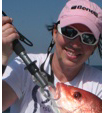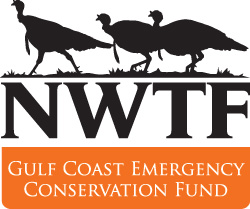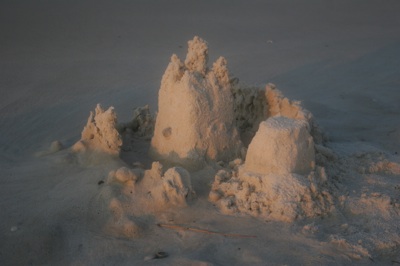 As conservationists, we are troubled by what we see happening to the ecosystem of the Gulf. As many of you know, I spent a few days fishing off Orange Beach recently, but am wondering how much longer it will remain unaffected by the oil spill. Perhaps seeing the Gulf in an untroubled and natural state weighs heavily on my thinking, and I hate to imagine it otherwise.
As conservationists, we are troubled by what we see happening to the ecosystem of the Gulf. As many of you know, I spent a few days fishing off Orange Beach recently, but am wondering how much longer it will remain unaffected by the oil spill. Perhaps seeing the Gulf in an untroubled and natural state weighs heavily on my thinking, and I hate to imagine it otherwise.
We ran a news release this week from the National Wild Turkey Federation that stated it established the Gulf Coast Emergency Conservation Fund to aide conservation and remediation efforts.  Donations go to the U.S. Fish and Wildlife Service and state wildlife agencies in Louisiana, Alabama, Mississippi and Florida. The NWTF recently shipped 125 transport boxes to the Louisiana Dept. of Wildlife and Fisheries in Baton Rouge and the boxes were distributed to LDWF’s incidence command centers along the Coast. In the release, Jimmy Stafford, LDWF’s wild turkey and small game program leader, said, “These transport boxes will be much more convenient when carried by boat than the bulky pet carriers. It is very thoughtful and generous for the NWTF to offer this help and it is much appreciated.”
Donations go to the U.S. Fish and Wildlife Service and state wildlife agencies in Louisiana, Alabama, Mississippi and Florida. The NWTF recently shipped 125 transport boxes to the Louisiana Dept. of Wildlife and Fisheries in Baton Rouge and the boxes were distributed to LDWF’s incidence command centers along the Coast. In the release, Jimmy Stafford, LDWF’s wild turkey and small game program leader, said, “These transport boxes will be much more convenient when carried by boat than the bulky pet carriers. It is very thoughtful and generous for the NWTF to offer this help and it is much appreciated.”
According to PR and Web Director Brent Lawrence, “The transport boxes we’ve sent down to the Gulf coast are being put to great use. We’ve sent more than 150 already, and we received a request today to send another 200 because they’re particularly effective with the big sea birds, such as pelicans. The boxes are designed to eliminate light and keep the birds from spreading out and hurting themselves. When you cut out light, birds basically go to sleep and calm down. It reduces their stress. The word is that these boxes are far superior to anything else they’re using.”
One of our readers, Terry Scoville, who publishes an excellent blog titled Women’s Hunting Journal, commented, “I am glad to hear that NWTF is doing all it can to help with this mega disaster. I have wondered where is the outrage of the U.S. citizens regarding this devastation. I trust that other organizations such as Delta Waterfowl and Ducks Unlimited are busy organizing their supporters. So far I have not seen or heard from them. BP and their back door handshakes with politicians have created this disaster and in my opinion it criminal.”
If you hear of other organizations pitching in to help with saving wildlife along the Coast, please feel free to comment here or send us the release. We’ll run it.
Also, remember that you can check the conditions at Gulf Shores here.
What does this have to do with women in the outdoors and this weblog? Why, everything … of course. Awareness of what’s being done, what can be done and where to point the finger of blame is important.
~Barbara Baird

No touch up required. A sand castle on Orange Beach, taken in late May 2010. Morning light ... by Barbara Baird.
Publisher/Editor Barbara Baird is a freelance writer in hunting, shooting and outdoor markets. Her bylines are found at several top hunting and shooting publications. She also is a travel writer, and you can follow her at https://www.ozarkian.com. View all posts by Barbara Baird
Thanks for the mention Barb. As a conservation organization, it’s important that we support our members and partners (i.e. state agencies) — not to mention conservation in general — in times like this. We’re happy to do our part to be part of the solution in the Gulf.
Barb, thanks for helping to keep us informed on those organizations that are doing what they can to help in this disaster. I would like be a part in helping, so if you know of anything we can do, please let us know. I will also be researching things we could possibly help with.